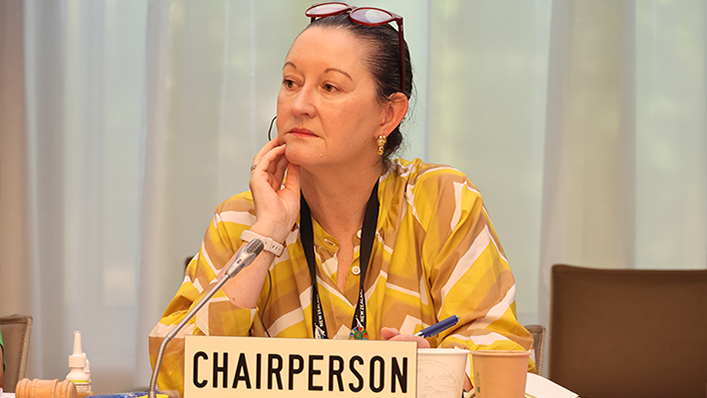
Future work of the Goods Council
The Chair of the CTG, Ambassador Clare Kelly (New Zealand), reported on her bilateral conversations with more than 20 delegations and group coordinators, where she sought their views on the Council’s functioning, the improvements introduced, and their expectations for future work. She said all members consulted were very pleased with the significant number of improvements implemented by the CTG through its reform discussions over the past two years. In particular, the introduction of the e-agenda, the annotated agenda and other digital tools have been viewed by them as game-changers that have significantly enhanced their access to information and facilitated their preparation for CTG meetings.
Ambassador Kelly said members had different ideas on how to improve different aspects of the Goods Council’s work, including on (i) enhancing the functioning of the CTG and its subsidiary bodies; (ii) improving discussions on trade concerns; and (iii) identifying steps to improve notification compliance in the goods area, particularly in assisting developing economies and least‑developed countries (LDCs). The Council agreed to hold an informal meeting in September to discuss these matters.
Trade concerns
The CTG reviewed 42 specific trade concerns (STCs), six of which were raised for the first time and 36 which were previously raised at past CTG meetings. The new trade concerns were (in alphabetical order):
- European Union — Proposal for a Regulation of the European Parliament and of the Council on Shipments of Waste and Amending Regulation — Request from Indonesia
- India — Medical Textiles Quality Control Order — Request from Indonesia
- India — Plywood and Wooden Flush Door Shutters Quality Control Order — Request from Indonesia
- Türkiye — Additional Tariffs on Imports of Passenger Vehicles from China — Request from China
- United States — New Section 301 Tariffs on Certain Goods from China and New Investigation on Maritime, Logistics, and Shipbuilding industry of China — Request from China
- Chinese Taipei — Industrial Relevance Policies in the Offshore Wind Sector — Request from the European Union
The previously raised trade concerns cover a wide range of measures, including non-tariff barriers, environmental policies, import/export restrictions, national security, halal certification, subsidy schemes and investigations, sanitary and phytosanitary (SPS) measures, discriminatory domestic taxes, administrative procedures, and trade disruptive and restrictive measures.
They also encompass a wide range of sectors, including agriculture, information technology, and forestry and food products, as well as specific products such as electric vehicles, electric batteries, liquors, air conditioners, apples and pears, cheese, pulses, cosmetics and tyres.
The Chair reminded delegations that the annex to the Annotated Agenda of the meeting contained links and cross‑references to discussions in other bodies, most of which were provided by the members requesting the inclusion of the agenda items and complemented by the Secretariat. Where available, direct links to the trade concerns database were also provided.
The full agenda of the meeting is available here.
Other issues
Bangladesh, on behalf of the Group of Least-Developed Countries (LDC Group) reiterated the group’s request to allow graduated LDCs to benefit from flexibilities in the Agreement on Subsidies and Countervailing Measures with regard to the use of export subsidies. Several developed economy members said they were willing to discuss the issue but that such discussions might be better suited for relevant technical committees, including the Committee on Subsidies and Countervailing Measures. The Goods Council took note of the statements made.
Finally, the Goods Council considered a communication from the European Union (G/L/1385/Add.6 ) concerning the “Withdrawal of the United Kingdom from the European Union: Procedures Under Article XXVIII:3 of GATT 1994”, and considered a Draft Decision on a “Procedure for the Introduction of Multiple Changes to the Harmonized System to Schedules of Concessions Using the Consolidated Tariff Schedules (CTS) Database” (G/C/W/846), which it agreed to forward to the General Council for approval.
Next meeting
The next CTG formal meeting is scheduled for 2-3 December 2024, with an informal meeting taking place in September.
Share
Reach us to explore global export and import deals